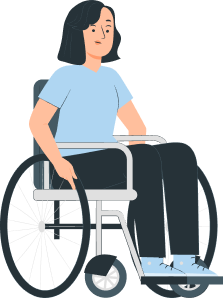The NDIS And Empowered
At Empowered, we’re committed to simplifying your journey. We understand that navigating the NDIS can be complex, so we’ve curated a selection of resources to help you gain a comprehensive understanding of the scheme. These resources are designed to guide you through the NDIS landscape and demonstrate how Empowered Community Services can assist you in achieving your goals

What is the NDIS?
The National Disability Insurance Scheme, or NDIS, is designed to ensure that individuals with disabilities receive the care and support they truly need. More than that, the NDIS empowers Participants with choice and control over the types of support that best align with their life goals.
Eligibility for the NDIS is determined by a permanent and significant disability that impacts one’s ability to engage in everyday activities. Recognising that everyone has unique goals and aspirations, the NDIS takes the time to understand you as an individual. This enables the scheme to identify the additional support you may need to live life on your terms and make meaningful progress towards your objectives. Once deemed eligible, you’ll receive individualised funding to cover the costs of the support services you require.
Am I Eligible for the NDIS?
The NDIA makes decisions about who can access the NDIS based on the information you provide about your disability and how it impacts your day-to-day life. To be eligible for the NDIS, you must:
- have a permanent disability that significantly affects your everyday ability or a developmental delay
- be less than 65 years old when you first access the NDIS
- be an Australian citizen, hold a permanent visa or a Protected Special Category visa, and
- live in a part of Australia where the NDIS is available.
We’ve provided a tool below to help you assess your eligibility and you can also find more information here.
01
Are you aged between 7 and 65?
Yes. Go to the next question.
No. I have a child aged under 7. Find out more about Help for children under 7.
No. I’m over 65. You must be under 65 to access the NDIS. You may be able to access other supports. Find out about NDIS and Aged Care.
02
Do you live in Australia and have Australian residency?
Yes. I live in Australia and I am an Australian citizen or have a Permanent or Special Category Visa. Go to the next question.
No. You may be able to access other supports. The NDIS is only available to:
- People who live in Australia
- Australian citizens
- Permanent Visa holders
- Protected Special Category Visa holders.
03
Do you usually need support from a person because of a permanent and significant disability?
I Know Someone Eligible!
If you’re a family member, friend, or professional looking to make a positive impact, you can effortlessly refer someone to Empowered Community Services using our user-friendly online referral form.
Simply click the button below to get started!

What Happens after a Referral?
The referral form will be forwarded to a Team Leader, who will promptly reach out to the Participant, family member, or Support Coordinator to arrange an initial meeting. During this meeting, we’ll collect all the essential details needed to craft a personalised support plan for you. This will encompass discussions about your NDIS goals, the types of support you require, and additional information that aids us in pairing you with the most suitable Support Worker.
After collating all the required information, we proceed to construct a comprehensive Participant profile. This enables our Support Workers to familiarise themselves with your specific needs prior to any shift, ensuring they are well-prepared to offer the support you require.
Next, we draft a service agreement that provides the Participant with a wealth of information on various subjects, such as rights and responsibilities, cancellation policies, a schedule of supports, and the overall budget for the service booking. A meet & greet is then scheduled, allowing the Participant to become acquainted with their designated Support Worker. This step is crucial in ensuring a smooth and comfortable transition to receiving support from Empowered.
Once the service agreement is signed and the meet & greet successfully completed, Empowered will commence with the roll-out of the scheduled supports, empowering you to begin working on achieving your NDIS goals.
Ongoing support doesn’t end there.
A Team Leader will continue to liaise with the Participant, family members, stakeholders, and Support Workers. This ensures that everything is progressing as planned and that the Participant remains on course to fulfil their NDIS objectives.